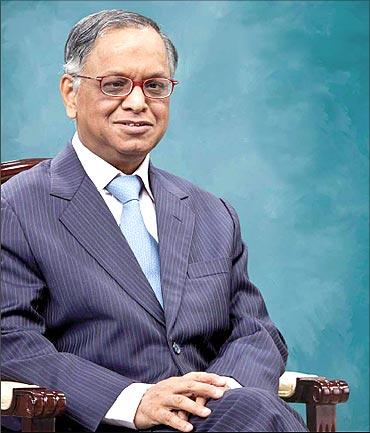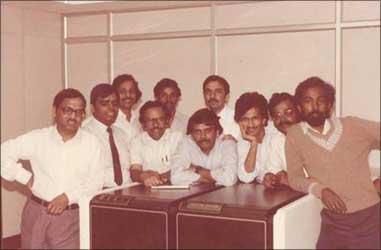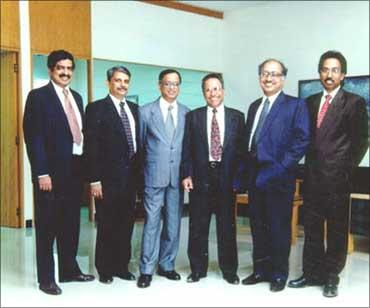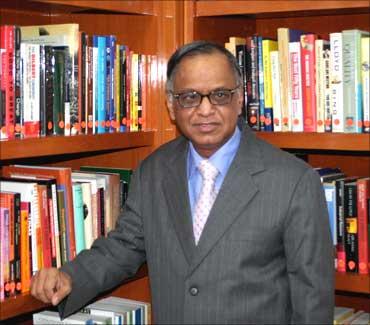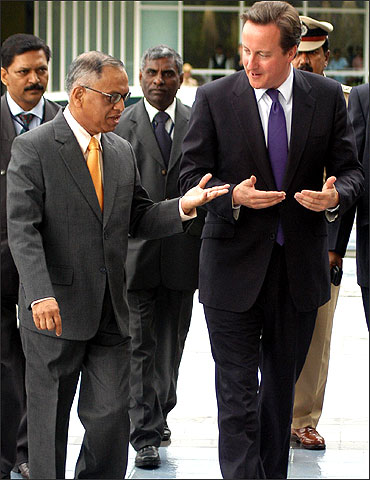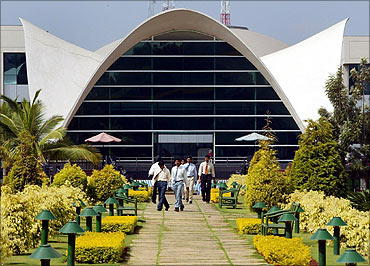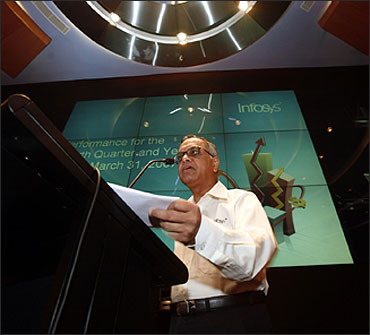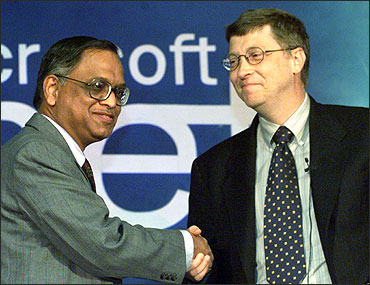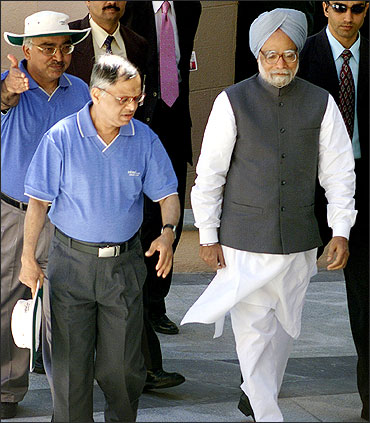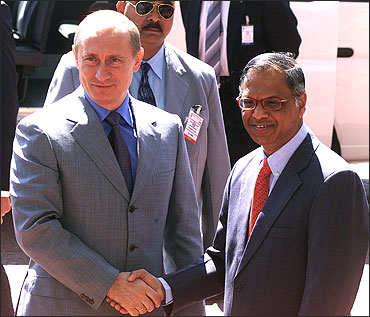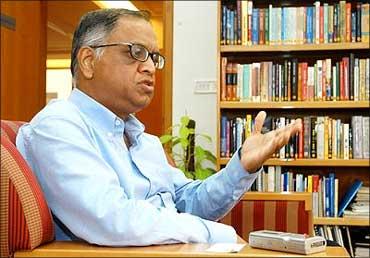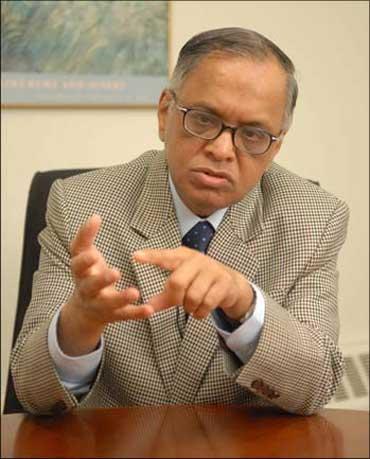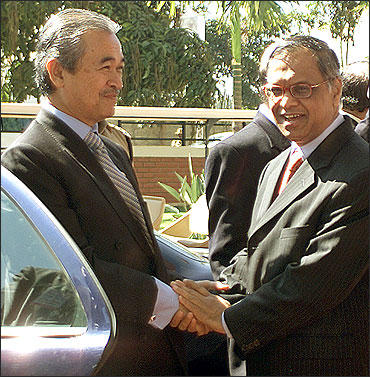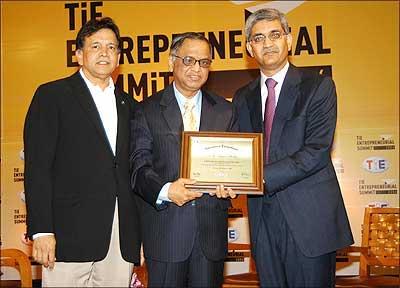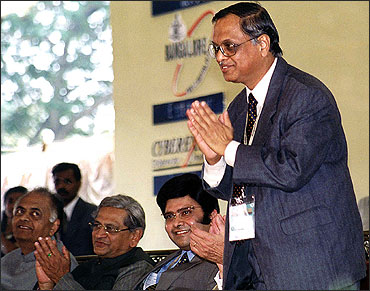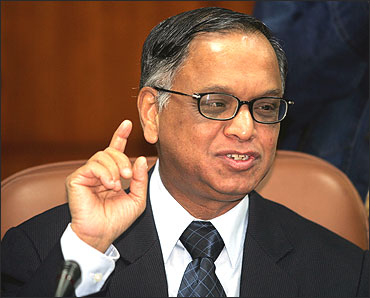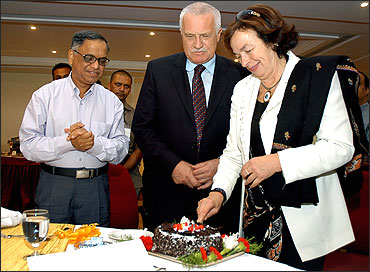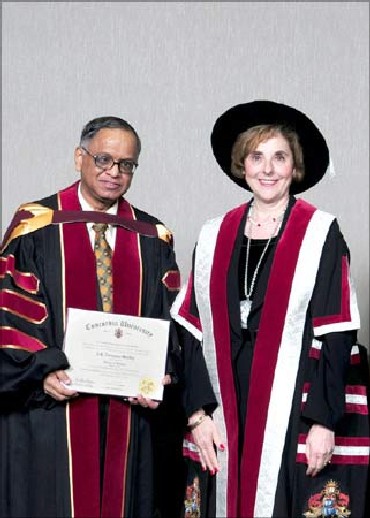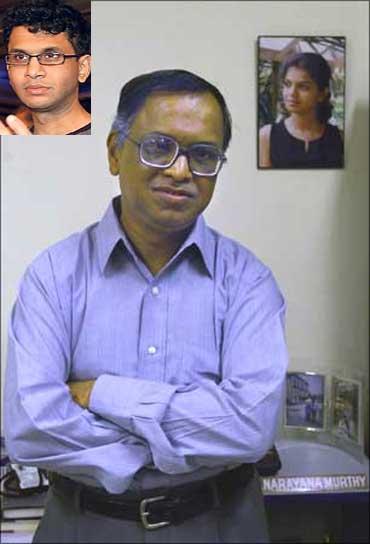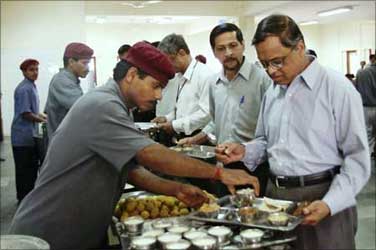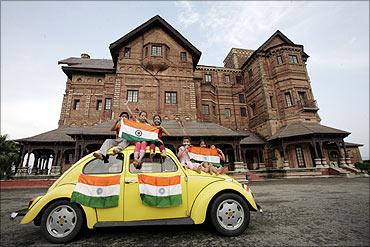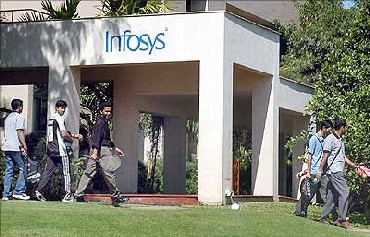 | « Back to article | Print this article |
After 30 years, it is Murthy's last day at Infosys
Having successfully steered Infosys to a place among the top IT companies of the world in the short span of 20 years, N R Narayana Murthy will step down as chairman of the company today, albeit with firm indications that he will continue to guide the organisation.
Murthy will hand over his role to K V Kamath, who has been an independent director on the Infosys board since May, 2009.
S D Sibulal will take over as the new CEO and MD and S Gopalakrishnan will be executive co-chairman of Infosys. Kris Gopalakrishnan, the current CEO of Infosys, who is also a co-founder, has been elevated as the executive co-chairman.
Murthy's exit as the chairman will mark the end of a formal association with the company, but he will continue to guide the organisation in the capacity of chairman emeritus.
"I would be called chairman emeritus. I will have a room which I can use if I want... but as propriety demands, I will have no say in any matter, I will not be allowed to attend any board meetings or any meetings. I can meet anybody personally," Murthy had said earlier.
After 30 years, it is Murthy's last day at Infosys
Infosys will host a farewell for Murthy at its campus in Bangalore in the evening, which will be attended by all seven co-founders and prominent former employees, including T V Mohandas Pai and Phaneesh Murthy and Murthy's family.
Murthy co-founded Infosys in 1981 in Pune with six other engineers and created thousands of millionaires courtesy its stock option schemes.
Infosys started its operations in a 10x10 room with a capital investment of just Rs 10,000, which was borrowed from Murthy's wife, Sudha Murthy. Now, its revenues have grown to Rs 27,000 crore (Rs 270 billion).
Murthy served as the founder CEO of Infosys for 21 years and was succeeded by co-founder Nandan Nilekani in March, 2002.
Born on August 20, 1946, in Karnataka, Murthy obtained his engineering degree (BE) from the University of Mysore in 1967.
He then attended the Indian Institute of Technology (IIT, Kanpur) for his master's degree (M Tech) in 1969.
Click on NEXT for more...
After 30 years, it is Murthy's last day at Infosys
Murthy's vision and business sense made the company go from strength to strength. In 1993, Infosys got listed in the Indian markets and later became the first Indian company to be listed on the New York-based Nasdaq in 1999.
In a testimony to Murthy's impact on the economy, Time magazine had named him among the Indians who are leading the country into its "next six decades".
"If any one person can be called the father of India's booming IT sector, it's N R Narayana Murthy, who with six other software engineers founded Infosys Technologies in 1981," Time magazine had said.
Murthy served as the company's CEO for over 20 years between 1981 and 2002 and as the Executive Chairperson of the board from 2002 to 2006.
He retired from his executive position at Infosys on August 20, 2006, after which he has been the non-executive chairman of the board and chief mentor of the company.
Click on NEXT for more...
After 30 years, it is Murthy's last day at Infosys
Murthy has led key corporate governance initiatives in India. He is an IT adviser to several Asian countries.
Besides juggling responsibilities at Infosys and at his venture capital initiative, Catamaran Investment Private Ltd, Murthy also serves on the boards of various entities, including HSBC, the Ford Foundation, Cornell University and Wharton School.
Murthy comes from a humble background and even after becoming a billionaire, he continues to lead a simple life.
Murthy had the opportunity to lead a public life, but declined an offer from former Prime Minister A B Vajpayee to join the government. He had then felt Infosys needed him more.
He now wants to focus his energies on mentoring and funding the next generation of Indian entrepreneurs.
Click on NEXT for more...
After 30 years, it is Murthy's last day at Infosys
Murthy's outstanding leadership qualities have been universally recognised and he serves on the boards of some of the world's biggest companies and organisations.
He was awarded the Padma Vibhushan, the country's second-highest civilian award after the Bharat Ratna, in 2008.
Besides, he has also been awarded the Legion d'Honneur by the French government and the Commander of the Order of the British Empire by the British government.
Last month, Murthy gave his nod to become the chief mentor of an IT panel being formed by the West Bengal government to prepare a roadmap for the industry and attract more investment in the sector.
A true barometer of his legacy will be how Infosys fares without him at the helm of affairs once he exits.
Click on NEXT to read Narayana Murthy's pearls of wisdom...
After 30 years, it is Murthy's last day at Infosys
"Even 63 years after Independence, 35 crore (350 million) Indians can't read and write.
Twenty-five crore (250 million) people do not have access to safe drinking water, while 75 crore (750 million) have no access to sanitation facilities.
The country has the largest mass of malnourished children, and 35 per cent of (total production of) grains are allowed to rot."
He said India has an installed electricity generation capacity of 145 gigawatts but only 84 gigawatts are available, which is sadly a shame.
Click on NEXT for more...
After 30 years, it is Murthy's last day at Infosys
"We have been able to get these opportunities because of the openness of some other countries.
I can't justify closing borders here in India. I am nobody to question the government.
But Infosys grew from a zero dollar to a nearly $5 billion company based on the openness of many economies.
As a child brought up in an environment of competition, an environment of openness, an environment of free movement of people, it is very very difficult for me to justify any of these."
Click on NEXT for more...
After 30 years, it is Murthy's last day at Infosys
"The reduction in corruption leads to faster economic growth of a country and this could have been the case in India also if graft had been curbed.
If we could have reduced the corruption in the country, we could have clocked a GDP growth of anywhere between 8.5 to 10 per cent.
If bribe giving, and not bribe taking, is made legal then the bribe giver shall indeed cooperate with the authorities to expose the bribe taker.
This is akin to bribe taker turning an approver under the current system and escaping punishment.
This sounds to be an interesting idea and I think it should be implemented."
Click on NEXT for more...
After 30 years, it is Murthy's last day at Infosys
"While all of private governance may not be good, private governance institutions have by and large done better because of competition, entry of multinational companies and the need to compete at the global level.
This country requires discipline like no other country.
We are like this because we are not a disciplined set of people. And that discipline has to start right in classrooms."
Click on NEXT for more...
After 30 years, it is Murthy's last day at Infosys
"The information technology industry has earned India a little bit of recognition in the world, first time in 300 years.
Today, we are thought of as people who can indeed do something worthwhile.
This was not so some 25 years ago. Indians (till three decades ago) were seen as people incapable of doing anything worthwhile.
Wherever you went, you were looked down upon as people worthy of pity. But that scenario has changed a little bit thanks to at least one (IT) industry."
Click on NEXT for more...
After 30 years, it is Murthy's last day at Infosys
"Murthy also condemned the tendency of students in resorting to rote with the sole aim of passing the examinations rather than attempting to learn and acquire knowledge.
We have not leveraged the power of education.
Our engineers have become people who learn by rote (a learning technique which focuses on memorisation), pass the examination and they are incapable of making a difference to the society."
Click on NEXT for more...
After 30 years, it is Murthy's last day at Infosys
Recalling an interacting with three new employees of Infosys, he said he asked the computer science graduates a fundamental and basic question to which they replied they had "forgotten it all" since the exams got over.
"I was stunned by their answer. Please be disciplined. Don't bunk classes. As a student, I attended every one of my classes."
Click on NEXT for more...
After 30 years, it is Murthy's last day at Infosys
"The older generation was the victim of the Licence Raj. Of the 21 years of my CEOship, about 11 years were lost in darkness. I used to make 50 visits to Delhi for small things.
We did not have current account convertibility; we could not open offices. To import even a small thing, it required huge efforts.
Today, that has changed and the focus is on the market. The focus has shifted from meandering through the corridors of power to satisfying clients through innovation and marketing."
Click on NEXT for more...
After 30 years, it is Murthy's last day at Infosys
"There is no way any government will give up job opportunities for its citizens in favour of those from other countries. India has stopped issuing visas to the Chinese whereas they have not yet done that.
I don't think we should criticise the government because its job is to protect jobs of Indians.
The US' responsibility is to protect the jobs of its citizens.
So, we need to be so innovative and so smart that these countries would say they need these people to protect the jobs of their local people.
As long as Indian companies bring innovation and as long as they are able to market that, India will be successful. But India will not be successful by closing its doors and sitting inside."
Click on NEXT for more...
After 30 years, it is Murthy's last day at Infosys
"My view has been to see in what way I could help entrepreneurs.
I became an entrepreneur in the first attempt. God was kind to us... we have created 113,000 jobs.
In the second journey, I thought if I could help entrepreneurs in some way, it will be a good effort. It may succeed, it may not.
Entrepreneurship, resulting in large-scale job creation, (is) the only viable mechanism for eradicating poverty in societies."
Click on NEXT for more...
After 30 years, it is Murthy's last day at Infosys
"If we have to make life better for these (rural) people and give them reasonable standards of living, disposable incomes, healthcare and nutrition and education, I personally believe we have to look at low-tech manufacturing to start with and then high-tech manufacturing in a big way just as China has done because most of these people are semi-literate or educated at a very basic level."
Click on NEXT for more...
After 30 years, it is Murthy's last day at Infosys
"I believe that we have all at some time eaten the fruit from trees that we did not plant.
In the fullness of time, when it is our turn to give, it behooves us in turn to plant gardens that we may never eat the fruit of, which will largely benefit generations to come.
I believe this is our sacred responsibility, one that I hope you will shoulder in time."
Click on NEXT for more...
After 30 years, it is Murthy's last day at Infosys
Dignity of labour is an integral part of the Western value system.
In the West, each person is proud about his or her labour that raises honest sweat. On the other hand, in India, we tend to overlook the significance of those who are not in professional jobs."
Click on NEXT for more...
After 30 years, it is Murthy's last day at Infosys
"Our political leaders use mobile phones to tell journalists on the other side that they do not believe in technology! If we want our youngsters to progress, such hypocrisy must be stopped."
Click on NEXT for more...
After 30 years, it is Murthy's last day at Infosys
"If the quality of the learning is high, the development gradient is steep, and, given time, you can find yourself in a previously unattainable place. I believe the Infosys story is living proof of this.
Learning from experience, however, can be complicated.
It can be much more difficult to learn from success than from failure. If we fail, we think carefully about the precise cause. Success can indiscriminately reinforce all our prior actions."
Click on NEXT for more...
After 30 years, it is Murthy's last day at Infosys
"It was on one of those rare nights at home during the late eighties. I was huddling with my young children, Rohan and Akshata, when Rohan, the most mischievous child I have ever come across, asked innocently whether I loved Infosys more than him and his sister.
I got away from that embarrassing situation by saying that I loved my children much more than anything else.
When I was spending l6 hour days in the office and was away from home for as many as 330 days in a year it was hard for my children to believe in my commitment to the family."
Click on NEXT for more...
After 30 years, it is Murthy's last day at Infosys
"When, one day, you have made your mark on the world, remember that, in the ultimate analysis, we are all mere temporary custodians of the wealth we generate, whether it be financial, intellectual, or emotional.
The best use of all your wealth is to share it with those less fortunate.
I believe that we have all at some time eaten the fruit from trees that we did not plant. In the fullness of time, when it is our turn to give, it behooves us in turn to plant gardens that we may never eat the fruit of, which will largely benefit generations to come.
I believe this is our sacred responsibility, one that I hope you will shoulder in time."
Click on NEXT for more...
After 30 years, it is Murthy's last day at Infosys
"I believe this greater awareness and knowledge of oneself is what ultimately helps develop a more grounded belief in oneself, courage, determination, and, above all, humility, all qualities which enable one to wear one's success with dignity and grace."
Click on NEXT for more...
After 30 years, it is Murthy's last day at Infosys
"In a country like India, when we have to make capitalism an attractive alternative to people, it is extremely important for us to show tremendous compassion to the less fortunate."
Click on NEXT for more...
After 30 years, it is Murthy's last day at Infosys
"Based on my life experiences, I can assert that it is this belief in learning from experience, a growth mindset, the power of chance events, and self-reflection that have helped me grow to the present.
Back in the 1960s, the odds of my being in front of you today would have been zero.
Yet here I stand before you! With every successive step, the odds kept changing in my favour, and it is these life lessons that made all the difference."
